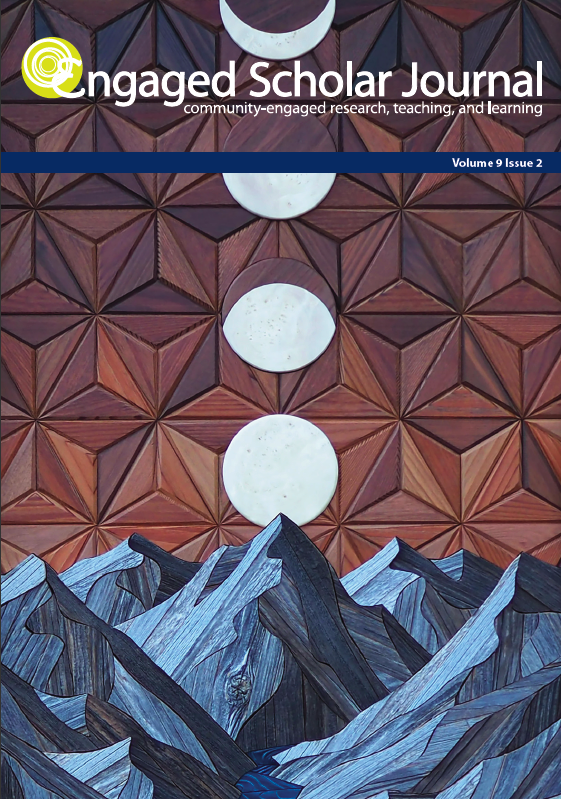The Haudenosaunee Ohén:ton Karihwatéhkwen Thanksgiving Address: Moving Beyond the Havoc of Land Acknowledgements
DOI:
https://doi.org/10.15402/esj.v9i2.70829Keywords:
Indigenous Knowledge education, Ohén:ton Karihwatéhkwen (Thanksgiving Address), Indigenous Resurgence, land-based education, Land AcknowledgementsAbstract
Abstract
This article aims to offer a broad theoretical engagement with the Haudenosaunee Ohén:ton Karihwatéhkwen (Thanksgiving Address) and the practice of giving thanks as a foundational Indigenous Knowledge education practice for elementary school age children. We propose a critical rethinking of the practice of the Land Acknowledgement and instead put forward the Thanksgiving Address as a way to center Indigenous Knowledge practices and education in school systems. We provide a brief overview of the history and practice of the Thanksgiving Address, and a critical examination of institutionalized land acknowledgments. The work of educators at the Jackman Institute for Child Study with land acknowledgements and the Thanksgiving Address offers insight into land and place-based pedagogical approaches that take up Indigenous knowledge education and challenges coopted practices of Indigenous education.
References
Asch, M., Tully, J., & Borrows, J. (2018a). Resurgence and reconciliation: Indigenous-settler relations and Earth Teachings. University of Toronto Press
Assembly of First Nations. (2021). Why treaties and why they are important. It’s our time. https:// education.afn.ca/afntoolkit/web-modules/plain-talk-4-treaties/1-treaties-and-why-they-are-important/
Blair, K. (2021). Empty gestures: Performative utterances and allyship. Journal of Dramatic Theory and Criticism, 35(2), 53–73. https://doi.org/10.1353/dtc.2021.0005
Castleden, H., Morgan, V.S., Lamb, C. (2019). “I spent the first year drinking tea” Exploring Canadian university researchers’ perspectives on community-based participatory research involving Indigenous Peoples: Researchers’ perspectives on CBPR. The Canadian Geographer/ Le Geographe Canadien, 56 (2), 160-179 https://doi.org/10.1111/j.1541-0064.2012.00432.x
Corneau, M. (2016). Strong stories kanyen’keha:ka. Strong Nations Publishing Inc.
Coulthard, G. S. (2014). Red skin, white masks: Rejecting the colonial politics of recognition. University of Minnesota Press.
Crawley, Mike. (2018, July 9). Ontario cancels curriculum rewrite that would boost Indigenouscontent. CBC. https://www.cbc.ca/news/canada/toronto/ontario-education-truth-and-reconciliation-commission-trc-1.4739297
Hill, Rick & Corbiere, Alan. (2021). Polishing the chain: Treaty relations in Toronto. [Video]YouTube. https://www.youtube.com/watch?v=HFdxbqLiAAk
Hill, S. M. (2017). The clay we are made of: Haudenosaunee land tenure on the Grand River. University of Manitoba Press.
Indigenous Education Network. (2020). Lunch and Learn Dish with One Spoon Wampum with Rick Hill Sr. [Video]. YouTube.https://www.youtube.com/watch?v=SiU5uvGXhxA
Invert Media. (2012). Four Directions Teachings. https://fourdirectionsteachings.com/
Jacobs, D.M. & Lytwn, V.P. (2020). Naagan ge bezhig emkwaan: A Dish with One Spoon reconsidered. Ontario Historical Society, 112 (2), 191-210.
JICS. (2022, May 16). About the Lab School. Jackman Institute of Child Study. https://www.oise.utoronto.ca/jics/lab-school/
Kaliwahe. [Lotikwahu] (2017). Oneida Thanksgiving. [Video] YouTube. 836 https://www.youtube. com/watch?v=Py3-q2VB6yM&ab_channel=Lotikwahu
Kenyon, T. (2022). Learn, Unlearn, Relearn. RSA Journal, 168(1(5588)), 26–31. https://www.jstor. org/stable/48708101
Kimmerer, R. W. (2013). Braiding sweetgrass. Milkweed Editions.
Kouri, S. (2020). Settler education: Acknowledgement, self-location, and settler ethics in teaching and learning. International Journal of Child, Youth and Family Studies, 11(3), 56-79. https:// doi.org/10.18357/ijcyfs113202019700
Kovach, M. (2021). Indigenous methodologies: Characteristics, conversations, and contexts (2nd ed.). University of Toronto Press.
Maracle, Lee. (2017). My conversations with Canadians. Book*hug Press.
Maynard, R., & Simpson, L. (2022). Rehearsals for living. Haymarket Books.
McGregor, Deborah. (2021). Taking Care of the treaties, Indigenous law, And environmental justice. [Video] YouTube. https://www.youtube.com/watch?v=MPi4Kf2sfA0
Mohawk, J. (2008). A Seneca greeting- Relationship requires us to be thankful. In M. K. Nelson (Ed.). Original Instructions: Indigenous Teachings for a Sustainable Future. Bear and Company Books.
Mohawks of the Bay of Quinte. (2019). Ohèn:ton Karihwatéhkwen. Mohawks of the Bay of Quinte. https://mbq-tmt.org/ohenton-karihwatehkwen/
Mojica, M. (2012). In plain sight: Inscripted earth and invisible realities: New Canadian Realisms. In Roberta Barker and Kim Solga (Eds). (pp. 218-242) (Vol #2) Playwrights Canada Press.
Nelson, Melissa K. (2008). Introduction. In M.K. Nelson (Ed.). Original instructions teachings for a sustainable future. (pp. 1-19). Bear and Company Books.
Porter, T. (2008). And Grandma said--: Iroquois teachings, as passed down through the oral tradition. Xlibris Corp.
Robinson, D., Hill, K. J. C., Ruffo, A. G., Couture, S., & Cooke Ravensbergen, R. (2019). Rethinking the practice and performance of Indigenous land acknowledgement. Canadian Theatre Review, 177, 20–30. https://doi.org/10.3138/ctr.177.004
Skä•noñh Great Law of Peace Center. (2016). Thanksgiving Address- Skä•noñh. [Video]. Grateful Living. https://grateful.org/resource/thanksgiving-address-haudenosaunee/
Simpson, Leanne. (2017). As we have always done. University of Minnesota Press.
The Truth and Reconciliation Commission of Canada. (2015). A Knock on the door: The essential history of residential schools from the truth and reconciliation commission of Canada, Edited and Abridged. University of Manitoba Press.
Tuck, E., & Gaztambide-Fernández, R. A. (2013). Curriculum, replacement, and settler futurity. Journal of Curriculum Theorizing, 29(1), 72–89. https://journal.jctonline.org/index.php/jct/ article/view/411
Tuck, Eve, McKenzie, Marcia & McCoy, Kate. (2014). Land education: Indigenous, post-colonial, and decolonizing perspectives on place and environmental education research. Environmental Education Research. https://doi.org/10.1080/13504622.2013.877708
Wark, Joe. (2021). Land acknowledgements in the academy: Refusing the settler myth. Curriculum Inquiry, 51:2, 191-209. https://doi.org/10.1080/03626784.2021.1889924
Welwood, John. (2011) Human Nature Buddha Nature: On Spiritual Bypassing, Relationship, and the Dharma (Tina Fossella Interviewer) Tricycle Magazine. http://www.johnwelwood.com/ articles/TRIC_interview_uncut.pdf
Wemigwans, J. (2018). A digital bundle: Protecting and promoting Indigenous knowledge online. University of Regina Press.
Downloads
Published
Issue
Section
License
Copyright (c) 2023 Jennifer Wemigwans, Lanna MacKay

This work is licensed under a Creative Commons Attribution 4.0 International License.
Authors who publish with this journal agree to the following terms:
- Authors retain copyright and grant the journal right of first publication with the work simultaneously licensed under a Creative Commons Attribution License CC BY 4.0 that allows others to share the work with an acknowledgement of the work's authorship and initial publication in this journal.
- Authors are able to enter separate, additional contractual agreements for the non-exclusive distribution of the journal's published version of the work (e.g., post it to an institutional repository or publish it in a book), with an acknowledgement of its initial publication in this journal.
- Authors are permitted to post their work online (e.g., in an institutional repository or on their website) after the publication of their work in the Engaged Scholar Journal.
- Please note that while every opportunity will be taken to ensure author participation in the editing process, due to time constraints final copyediting changes may be made before publication to ensure APA adherence throughout all submissions.




